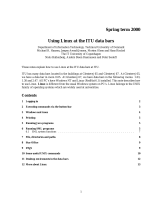
TECHNICAL FILE
R03.002_19/07/2016
You can nd out more information about the technical features of Emac®’s products by downloading
its Technical File in www.emac.es.
If you have any query, please contact our Technical Department in tecnico@emac.es.
Technical information
www.emac.es
The data provided are for information only and have been obtained by our supplier or Emac®.
Does not constitute legal guarantee in terms of properties and / or functionality of the application of material
Novopeldaño® 4 Aluminum
Page 3 de 3
Outdoors Indoors
Flooring
Installation
1. Spread a big amount of thin-set mortar on the surface of the riser.
2. Place the tile on the riser and press to get an optimal adherence.
3. Then, spread a big amount of thin-set mortar on the tread and align the prole on its vertex so it
rests on the riser (Do not let overhang, the leverage may remove the step and the tiles). Then press
so the thin-set mortar could pass through the mechanized holes of the anchoring wing. Be also
sure you ll the inside of the prole to reinforce the installation.
4. Place one tile on the tread, align it to the prole and press to get a perfect adhesion. You can tap it
softly with a rubber hammer.
5. Clean the possible leftover material and let dry.
Cleaning and maintenance
This product must be cleaned periodically with a soft cloth. If you use a neutral liquid cleaner, you must
rinse the prole with cold water and dry it to remove the humidity excess. The persistent dirtiness can
be removed by using cleaning approved agents lightly abrasive or a grid covered with polished powder
neutral. If a preserving agent is applied, as well as keep a very thin layer of water repellent, note that it
can’t be yellow,attract dust or dirt or have iridescent effects.
Steel wool, abrasive cleaners, souring products as well as strong acids (hydrochloric and
perchloric),strong bases (caustic soda or ammonia) or carbonated solutions are not recommended.
Citric acid is neither recommended because disolves the protective layer of the surface of aluminium.
Waxes, petrolatum, lanolin or similar substances are not appropriate. Solvents containing haloalkanes
(hydrouoroether and chlorinated solvents) and curing accelerators containing chlorides should not be
used (use special accelerators free of chlorides).

